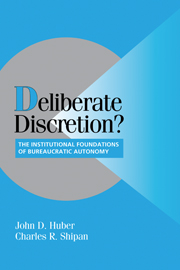Book contents
- Frontmatter
- Contents
- List of Tables
- List of Figures
- Preface
- 1 LAWS, BUREAUCRATIC AUTONOMY, AND THE COMPARATIVE STUDY OF DELEGATION
- 2 RATIONAL DELEGATION OR HELPLESS ABDICATION? THE RELATIONSHIP BETWEEN BUREAUCRATS AND POLITICIANS
- 3 STATUTES AS BLUEPRINTS FOR POLICYMAKING
- 4 A COMPARATIVE THEORY OF LEGISLATION, DISCRETION, AND THE POLICYMAKING PROCESS
- 5 LEGISLATION, AGENCY POLICYMAKING, AND MEDICAID IN MICHIGAN
- 6 THE DESIGN OF LAWS ACROSS SEPARATION OF POWERS SYSTEMS
- 7 THE DESIGN OF LAWS ACROSS PARLIAMENTARY SYSTEMS
- 8 LAWS, INSTITUTIONS, AND POLICYMAKING PROCESSES
- APPENDIX A MMC LAWS USED IN CHAPTER 3
- APPENDIX B POLICY CATEGORIES USED FOR MMC LAWS IN CHAPTER 3
- APPENDIX C PROCEDURAL CATEGORIES USED FOR MMC LAWS IN CHAPTER 3
- APPENDIX D THE FORMAL MODEL OF DISCRETION
- References
- Author Index
- Subject Index
- Titles in the series
4 - A COMPARATIVE THEORY OF LEGISLATION, DISCRETION, AND THE POLICYMAKING PROCESS
Published online by Cambridge University Press: 05 June 2012
- Frontmatter
- Contents
- List of Tables
- List of Figures
- Preface
- 1 LAWS, BUREAUCRATIC AUTONOMY, AND THE COMPARATIVE STUDY OF DELEGATION
- 2 RATIONAL DELEGATION OR HELPLESS ABDICATION? THE RELATIONSHIP BETWEEN BUREAUCRATS AND POLITICIANS
- 3 STATUTES AS BLUEPRINTS FOR POLICYMAKING
- 4 A COMPARATIVE THEORY OF LEGISLATION, DISCRETION, AND THE POLICYMAKING PROCESS
- 5 LEGISLATION, AGENCY POLICYMAKING, AND MEDICAID IN MICHIGAN
- 6 THE DESIGN OF LAWS ACROSS SEPARATION OF POWERS SYSTEMS
- 7 THE DESIGN OF LAWS ACROSS PARLIAMENTARY SYSTEMS
- 8 LAWS, INSTITUTIONS, AND POLICYMAKING PROCESSES
- APPENDIX A MMC LAWS USED IN CHAPTER 3
- APPENDIX B POLICY CATEGORIES USED FOR MMC LAWS IN CHAPTER 3
- APPENDIX C PROCEDURAL CATEGORIES USED FOR MMC LAWS IN CHAPTER 3
- APPENDIX D THE FORMAL MODEL OF DISCRETION
- References
- Author Index
- Subject Index
- Titles in the series
Summary
We now turn to the main analytic task of the book, which is to develop a theory about how politicians design statutes that will affect agency discretion. Like previous arguments, our theory is built on the simple premise that politicians are motivated by policy considerations. The policy motivations could stem from electoral considerations – politicians may want to produce the policy outcomes that will get them reelected. Alternatively, politicians might simply have an intrinsic interest in policy itself, either for selfish or altruistic reasons. Regardless of their origin, these policy motivations create a challenge for politicians, who must decide how to use legislation in the pursuit of desired policy outcomes.
In Chapters 1 and 3, we provided examples of the ways in which different legislatures can take quite different pathways to making policy on the same sorts of issues, with some legislatures at some times writing very detailed statutes and other legislatures at other times writing vague, general statutes. To explain such differences, our theory focuses on the political environment in which legislators find themselves. As noted in Chapter 2, two important elements of this environment have been carefully investigated by previous researchers. The first is the extent to which politicians' policy goals and preferences diverge from those of bureaucrats (e.g., Epstein and O'Halloran 1994, 1999; Martin 1997). As divergence increases, so do incentives to use details in statutes to micromanage policy implementation.
- Type
- Chapter
- Information
- Deliberate Discretion?The Institutional Foundations of Bureaucratic Autonomy, pp. 78 - 108Publisher: Cambridge University PressPrint publication year: 2002

